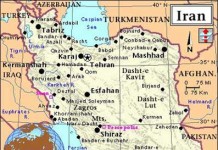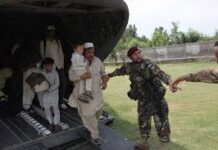Context
 With the availability of numerous on-line news sites and global information sources, deciphering a given situation, or affairs of a particular part of the world, has become quite cumbersome. Obviously, the readers are not actually present on the ground to understand the dynamics and grasp the different angles. They are relying on the one relaying the information to present the facts and the situation. The irony is, more and more, even the reporter is not located on the ground.
With the availability of numerous on-line news sites and global information sources, deciphering a given situation, or affairs of a particular part of the world, has become quite cumbersome. Obviously, the readers are not actually present on the ground to understand the dynamics and grasp the different angles. They are relying on the one relaying the information to present the facts and the situation. The irony is, more and more, even the reporter is not located on the ground.
Thus the credibility of the media house and objectivity of the reporter and analyst, takes on immense importance. However, to think that the author is independent and not influenced by his own ideological tilt and belief systems would also be naïve. A good writer, however, will constantly check to counter any such tendencies. Then there could be external pressures and influences that also come into play.
If the initial reporting of the facts is flawed, it will cause all subsequent analysis to be erroneous as well. However, the user of the of the information would not know this, and will lead him to develop an opinion that is not connected with reality, and this may result in a faulty and costly decision at some point.
From the perspective of the reader, the best approach to take these days is to treat all information with suspicion, and not as the literal truth. Moreover, the users of these global information sources should learn how to understand and synthesize the news and analysis they are being presented, in order to develop an accurate assessment of an issue or a situation.
The consumers of media information in Pakistan, and else where, need to get sophisticated in deciphering the media, the ideological divides, and what they may mean. It’s not the loyalty to the country that is often at stake, but a lack of comprehension on the existence of different approaches to address the present challenges and the way out. Similarly, the media houses should not hide under the garb of their ideological tilts, and present information as the truth or reality, when they may actually be lobbying. When this distinction is lost, even deeper risks and circumstances result.
Analysis
Making Sense of News
It’s remarkable how a single event can have various interpretations. First of all, the reader should ask if someone is deliberately attempting to shape or create a certain perception as part of what is known as strategic communication. The free flow of information accompanies with it the risk that an actor is attempting to create a favorable opinion about an issue or policy related to the player’s interests. Research suggests the elements of soft power work best when people trust it. However, the trust can also be easily lost and very hard to regain as many western media sources are discovering.
The reader should also attempt to understand the ideological slant. More and more, it’s the ideological underpinnings that are overshadowing the media coverage of the various events in Pakistan, and mimic the political divide that otherwise exists in the society. They can be defined as the Liberal, Nationalist, and Conservative perspectives. It should be noted that such political divisions occur in many other democracies around the world. They reflect distinct outlooks for how a country should deal with its current challenges and move to the future.
The Nationalists
For example, in Pakistan, the Nationalists are of the belief that majority of the security problems being confronted by the country have external causes, and foreign powers are conspiring to manufacture a civil war in the country. Once such circumstances have manifested, the global powers will declare Pakistan unsafe to possess nuclear weapons. This is also the reason that some Nationalist are weary of Pakistan’s involvement in the campaign against extremists, which has progressively destabilized the nation and weakened its economy.
Moreover, the Nationalist have strong anti-India posture and believe that country is bending over backward to improve ties and enhance trade with India, when the later has not reciprocated in a similar spirit. Furthermore, the Nationalists believe that India and Afghanistan are conspiring to ethnically divide the country. Most importantly, the Nationalists strongly support the military as an institution.
The Liberals
On the other hand, the Liberals are of the view that Pakistan’s past use of proxies in Afghanistan and India has produced a backlash against it, and that is the main reason for the predicament it presently faces. In other words, Pakistan should have never joined the Cold War and gotten involved in the Afghan Jihad. Since these actions were taken under a military dictator, it blames the army for what ails the country currently. The Liberals strongly support improving trade ties with India and Afghanistan and that it may also result in improving the security situation.
The Conservatives
For all intents and purposes, the mainstream religious parties, such as Jamatey Islami, represent the Conservatives. The views of the Conservatives are nearer to the ones held by the Nationalists when it comes to policy over major domestic and international issues. Especially relating to parting with war against extremists and over ties with India. The Conservatives have also been staunch supporter of the military and have been sympathetic to the views of the militant and extremist groups.
Pakistan and Global Media
When it comes to major media houses of Pakistan, ARY Channel has presented an outlook held by the Nationalists while Express and Geo Media channels have catered to the Liberal point of view. With both groups somewhat catering to the Conservatives as well. This is similar to the US where Fox has voiced the Conservative point of view while MSNBC has tilted more towards the Liberal viewpoint.
In the US, however, such differences have not created questions related to the loyalty to the country; and are taken as representing different approaches to solve the nations problems.
Moreover, different international actors attempt to lobby the Conservative (Republicans) and the Liberal (Democrats) representatives based on their stand on different policies and global outlook. How the political leaders in US balance the national interest while catering to various international voices is a demonstration of how real power politics and diplomacy plays out at the world level.
Through the strategic use of information, one can shape a version that is closer to ones interests and future outlook. No wonder global players like China (CCTV) and Russia (Russia Today) are now spending big bucks to open their own English media houses and convey their story to the world. A British journalist Chris Tryhorn wrote in Nov 2013,
“With plenty of foreign faces on screen on its English, French, Spanish, Arabic and Russian channels, CCTV doesn’t seem all that Chinese. In contrast with the consciously anti-western slant of RT (Russia Today) and Iran’s Press TV, CCTV plays things pretty straight, but unsurprisingly avoids controversial issues facing China and its government.”
According to Daud Moradian, a former foreign ministry advisor in Afghanistan, Iran spends $100 million a year in the country. A major portion of this assistance goes to media, civil society projects and religious schools. Reports indicate nearly one third of Afghanistan’s media is either backed by Iran financially or through providing content. Afghanistan’s intelligence department, National Directorate of Security, had alleged in 2012 that Iran was meddling in Afghanistan and was funding weekly Ensaf, including Tamadon and Noor TV channels.
With significant changes taking place in Europe, US recently decided to shift $10 million from the $1.5 billion Kerry-Lugar-Berman annual fund meant for Pakistan, to support and expand Ukrainian, Balkan, Russian, and Tatar language services of Radio Free Europe, Radio Liberty and Voice of America.
The consumers of media information in Pakistan, and else where, need to get sophisticated in deciphering the media, the ideological divides, and what they may mean. It’s not the loyalty to the country that is often at stake, but a lack of comprehension on the existence of different approaches to address the present challenges and the way out. Similarly, the media houses should not hide under the garb of their ideological tilts, and present information as literal truth or reality when they actually may be lobbying. Whenever this has been done, it has produced even deeper risks than the ones it was originally attempting to avoid.



